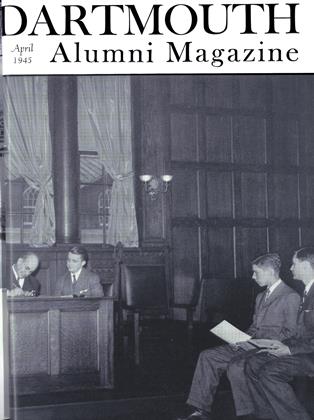A Brief Anthology of Dartmouth Poets at War
IT is NOT STRANGE that sureness, intensity, emotional and intellectual honesty should stay alive during war, because these things are the very stuff of life, and there's something makes us fight death more strongly the nearer it is. So we might expect those Dartmouth men who have known the necessity of saying, in some kind of a form, the things they find important to be said—the poets we might expect them to be vigorous and alive now. And this is true.
There is certainty and hope in the writing of Dartmouth poets who are serving in the armed forces. This is a dogma; but the art, or the creativity, or the fun and youth of real people is always dogma-dogma that establishes the real orthodoxy of form that grows out of matter. There are things we must be sure about: the difference between right and wrong, whether and when to fight, the meanings of love and hate. Poets state these surenessesoften by making the questions of them vivid; sometimes even by negating themand in that statement they show (if they be poets at all) the three things without which one cannot be a poet, or, indeed, a responsive person—a man in a world of men: they show humanity, love, and courage.
Humanity is the link a man has to reality, to the world which he may hate, but he must live in. Love is the link he has to other men—that is to say, to eternity. But courage is the sine qua non. A man may have humanity and love and never have the courage to use them, to say them; if he has courage-and it must be utter courage, it must be beyond life and death he can make a poem. That s a kind of wonder that makes a difference.
Among the many courageous Dartmouth men in the war (and how shall we ever know how many and how great?) there are several of the poets who have a meaning beyond the bareness of words on paper. Here I have chosen five-among the youngest, because it will be they, or their kind, whom we will find writing this generation's poetry. There is an arbitrariness in the selection, for I cannot know all who are now writing, I cannot contact some J do know. Yet these are surely representative, and perhaps more important, they all wish to communicate.
Let me introduce them briefly—and then let their poems say the important things. The oldest of the group is Sam Morse '36, a sergeant in the Army Air Forces. Last year he published his first volume of verse, Time of Year. Bill Bronk '38 is a lieutenant in the Army, last stationed at Camp Pendleton, Virginia. Ted Boorum '40 is a sergeant in the Army, now overseas; he has a book of verse in preparation. Ed Rasmussen '42 is a corporal in the Army, engaged in confidential work at Ann Arbor, Michigan, when last heard from. Ed Kuhn '46 is the youngest. He was a member of the Marine Corps Detachment at Dartmouth until last June, after which he went into training at Parris Island. These are the barest facts. But the rest you can see for yourself. Here they are:
WITH A NOTE
 View Full Issue
View Full Issue
More From This Issue
-
 Article
ArticleRADIO WAVES AND RADAR
April 1945 By GORDON FERRIE HULL JR. '33, -
 Lettter from the Editor
Lettter from the Editor'Round the Girdled Earth
April 1945 By H. F. W. -
 Article
ArticleLaureled Sons of Dartmouth
April 1945 By H. F. W. -
 Class Notes
Class Notes1918
April 1945 By ERNEST H. EARLEY, DONALD L. BARR -
 Class Notes
Class Notes1945
April 1945 By ARTHUR NICHOLS -
 Article
ArticleMedical School
April 1945
EDWARD McD. FRITZ '40
Article
-
 Article
ArticleLOCAL TAX REVISION
December 1960 -
 Article
ArticleCircling the Green
September 1980 -
 Article
ArticleThe Hanover Scene
April 1954 By BILL McCARTER '19 -
 Article
ArticleSoccer
November 1951 By Francis E. Merrill '26 -
 Article
ArticleTrack Coach for 35 Years
March 1945 By Francis E. Merrill '26. -
 Article
ArticleMedical School
DECEMBER 1963 By HARRY W. SAVAGE M'27


